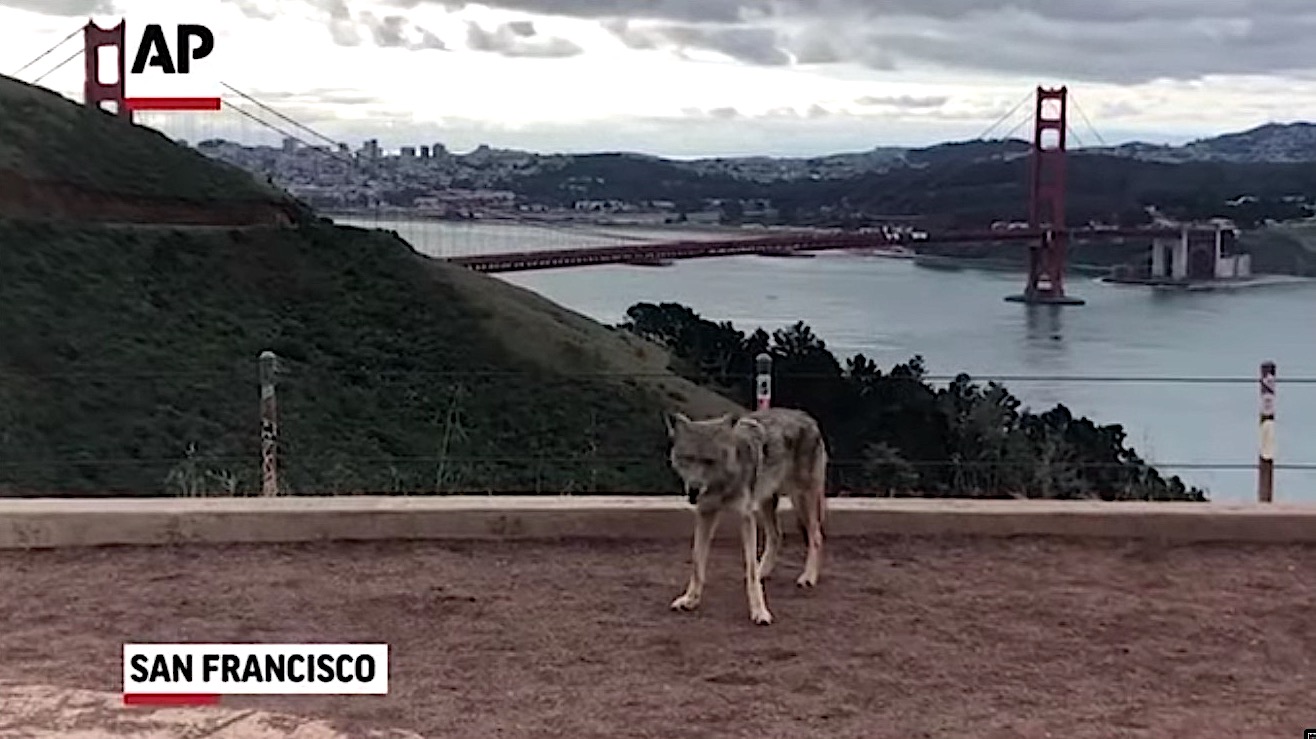This 50th Earth Day, humans are locked inside and nature is temporarily ascendant


A free daily email with the biggest news stories of the day – and the best features from TheWeek.com
You are now subscribed
Your newsletter sign-up was successful
As Earth Day turns 50 on Wednesday, you don't have to imagine no pollution. Amid all the human suffering and death from the COVID-19 pandemic, "an unplanned grand experiment is changing Earth," The Associated Press reports. "As people across the globe stay home to stop the spread of the new coronavirus, the air has cleaned up, albeit temporarily," sometimes with dramatic effect.
There are blue skies over New Delhi for the first time in years and Jalandhar residents saw the snow-capped Himalayas for the first times in decades. Pollution levels were down double digits in cities all over the world. Animals roamed freely through parks and cities — pumas in Santiago, Chile; coyotes in downtown Chicago and San Francisco; goats overrunning a town in Wales.
The animals were always there, Duke University conservation scientist Stuart Pimm tells AP, but they are shy around humans. Sea turtles worldwide seem to be nesting and hatching much more successfully without humans around, says David Godfrey at the Sea Turtle Conservancy. "There's some silver lining for wildlife in what otherwise is a fairly catastrophic time for humans."
The Week
Escape your echo chamber. Get the facts behind the news, plus analysis from multiple perspectives.

Sign up for The Week's Free Newsletters
From our morning news briefing to a weekly Good News Newsletter, get the best of The Week delivered directly to your inbox.
From our morning news briefing to a weekly Good News Newsletter, get the best of The Week delivered directly to your inbox.

"That doesn't mean the comeback will last," Hope Corrigan writes at Quartz, with photos of nature triumphant. "Scientists warn that the effects of the economic shutdown caused by COVID-19 are temporary." And greenhouse gasses can stay in the atmosphere for a century or more, "so the pandemic shutdown is unlikely to affect global warming," AP reports.
Climate change "wasn't really on the radar for most people in 1970," climate reporter John Schwartz tells The New York Times. But since that first Earth Day 50 years ago, "the air over the U.S. is much cleaner, and so is the water we drink in most parts of the country. We don't use DDT or asbestos."
The coronavirus pause "is giving us this quite extraordinary insight into just how much of a mess we humans are making of our beautiful planet," Pimm says. "This is giving us an opportunity to magically see how much better it can be."
A free daily email with the biggest news stories of the day – and the best features from TheWeek.com
Peter has worked as a news and culture writer and editor at The Week since the site's launch in 2008. He covers politics, world affairs, religion and cultural currents. His journalism career began as a copy editor at a financial newswire and has included editorial positions at The New York Times Magazine, Facts on File, and Oregon State University.
-
 ‘Poor time management isn’t just an inconvenience’
‘Poor time management isn’t just an inconvenience’Instant Opinion Opinion, comment and editorials of the day
-
 Bad Bunny’s Super Bowl: A win for unity
Bad Bunny’s Super Bowl: A win for unityFeature The global superstar's halftime show was a celebration for everyone to enjoy
-
 Book reviews: ‘Bonfire of the Murdochs’ and ‘The Typewriter and the Guillotine’
Book reviews: ‘Bonfire of the Murdochs’ and ‘The Typewriter and the Guillotine’Feature New insights into the Murdoch family’s turmoil and a renowned journalist’s time in pre-World War II Paris
-
 ‘One Battle After Another’ wins Critics Choice honors
‘One Battle After Another’ wins Critics Choice honorsSpeed Read Paul Thomas Anderson’s latest film, which stars Leonardo DiCaprio, won best picture at the 31st Critics Choice Awards
-
 Son arrested over killing of Rob and Michele Reiner
Son arrested over killing of Rob and Michele ReinerSpeed Read Nick, the 32-year-old son of Hollywood director Rob Reiner, has been booked for the murder of his parents
-
 Rob Reiner, wife dead in ‘apparent homicide’
Rob Reiner, wife dead in ‘apparent homicide’speed read The Reiners, found in their Los Angeles home, ‘had injuries consistent with being stabbed’
-
 Hungary’s Krasznahorkai wins Nobel for literature
Hungary’s Krasznahorkai wins Nobel for literatureSpeed Read László Krasznahorkai is the author of acclaimed novels like ‘The Melancholy of Resistance’ and ‘Satantango’
-
 Primatologist Jane Goodall dies at 91
Primatologist Jane Goodall dies at 91Speed Read She rose to fame following her groundbreaking field research with chimpanzees
-
 Florida erases rainbow crosswalk at Pulse nightclub
Florida erases rainbow crosswalk at Pulse nightclubSpeed Read The colorful crosswalk was outside the former LGBTQ nightclub where 49 people were killed in a 2016 shooting
-
 Trump says Smithsonian too focused on slavery's ills
Trump says Smithsonian too focused on slavery's illsSpeed Read The president would prefer the museum to highlight 'success,' 'brightness' and 'the future'
-
 Trump to host Kennedy Honors for Kiss, Stallone
Trump to host Kennedy Honors for Kiss, StalloneSpeed Read Actor Sylvester Stallone and the glam-rock band Kiss were among those named as this year's inductees
